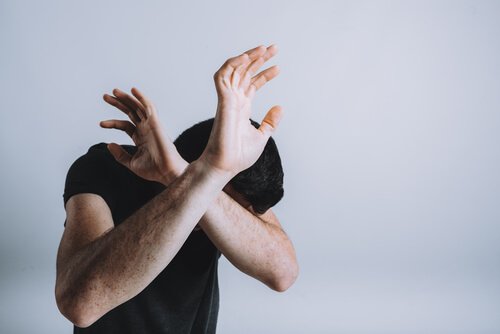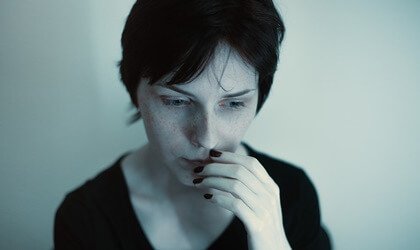Nosophobia: The Irrational Fear of Contracting a Disease

The fear of getting sick or nosophobia is an atavistic fear, just like the fear of death and madness. Let’s be honest: who isn’t afraid of contracting a serious disease? Aren’t we all scared of becoming mad one day? Isn’t everyone afraid of death?
This article is all about nosophobia: an irrational, intense fear of getting sick. The particularity of this condition is that the individual doesn’t think they’re sick at the moment. This is actually what differentiates it from hypochondria.
Hypochondriacs aren’t afraid of contracting a disease in the future. Nosophobics, on the other hand, are deadly afraid of this. Hypochondriacs are afraid of suffering from an acute disease in the present moment and not of being diagnosed with one.
What is a phobia?
The term ‘phobia’ refers to an intense and irrational fear towards a person, object, or situation that involves little to no danger. This word comes from the Greek word phobos, which means panic. In Greek mythology, Phobos, who was the son of Aphrodite (the goddess of love) and Ares (the God of war) personified fear. Alexander the Great always prayed to Phobos before a battle in order to shake off his fears.
In the Diagnostic and Statistical Manual of Mental Disorders (DSM-V), nosophobia is listed in the phobias section.
DSM-V diagnostic criteria for a specific phobia
- Marked fear or anxiety about a specific object or situation (e.g., flying, heights, animals, receiving an injection, seeing blood). Note: In children, the fear or anxiety may be expressed by crying, tantrums, freezing, or clinging.
- The phobic object or situation almost always provokes immediate fear or anxiety.
- The phobic object or situation is actively avoided or endured with intense fear or anxiety.
- The fear or anxiety is out of proportion to the actual danger posed by the specific object or situation and to the sociocultural context.
- The fear, anxiety, or avoidance causes clinically significant distress or impairment in social, occupational, or other important areas of functioning.
- The fear, anxiety, or avoidance is persistent, typically lasting for 6 months or more.
The fear, anxiety, or avoidance causes clinically significant distress or impairment in social, occupational, or other important areas of functioning. - The disturbance is not better explained by symptoms of another mental disorder, including fear, anxiety, and avoidance of situations associated with panic-like symptoms or other incapacitating symptoms; objects or situations related to obsessions; reminders of traumatic events; separation from home or attachment figures; or social situations.
It’s common for people to have multiple specific phobias. In fact, approximately 75% of those who suffer from a specific phobia fear more than one situation or object.

Nosophobia or irrational fear of contracting a disease
As we said earlier, nosophobia is the irrational fear of contracting a specific disease or any other condition in general. Those who suffer from nosophobia develop an exaggerated fear of diseases and are often impressed by particular cases or illnesses.
Here are some of the symptoms of nosophobia:
- Exaggerated nervousness before any minor physical symptom.
- Extreme measures to avoid contact with germs.
- Frequent and repeated visits to different doctors, although they also avoid them.
- Intense fear of having a doctor confirm they’re suffering from the dreaded disease.
Health concerns can be dominant issues which manifest themselves at a cognitive level (frequent ruminations on health). There are also frequent emotional symptoms such as experiencing anxiety or dysphoric mood due to intense fear and behavioral symptoms such as unjustified medical consultations.
Anxiety about getting sick
Nosophobia is oftentimes classified as a somatic symptom disorder. However, in some cases, it’s best to diagnose it as an illness anxiety disorder.
High anxiety levels usually accompany the idea of contracting a disease. Most diseases tend to alarm those with nosophobia. This happens when they hear that someone has become ill or when they read health-related news.
When nosophobics notice a physical symptom, their outrageous anxiety levels make them postpone going to the doctor to get tested. Nosophobics have such an intense fear of suffering from an illness that they avoid any circumstance that may confirm it. They simply prefer to close their eyes and live in uncertainty.

As you can see, nosophobia and hypochondria aren’t exactly the same. If you or someone you know is experiencing an intense fear related to one or more diseases, we recommend psychological therapy.
The fear of getting sick or nosophobia is an atavistic fear, just like the fear of death and madness. Let’s be honest: who isn’t afraid of contracting a serious disease? Aren’t we all scared of becoming mad one day? Isn’t everyone afraid of death?
This article is all about nosophobia: an irrational, intense fear of getting sick. The particularity of this condition is that the individual doesn’t think they’re sick at the moment. This is actually what differentiates it from hypochondria.
Hypochondriacs aren’t afraid of contracting a disease in the future. Nosophobics, on the other hand, are deadly afraid of this. Hypochondriacs are afraid of suffering from an acute disease in the present moment and not of being diagnosed with one.
What is a phobia?
The term ‘phobia’ refers to an intense and irrational fear towards a person, object, or situation that involves little to no danger. This word comes from the Greek word phobos, which means panic. In Greek mythology, Phobos, who was the son of Aphrodite (the goddess of love) and Ares (the God of war) personified fear. Alexander the Great always prayed to Phobos before a battle in order to shake off his fears.
In the Diagnostic and Statistical Manual of Mental Disorders (DSM-V), nosophobia is listed in the phobias section.
DSM-V diagnostic criteria for a specific phobia
- Marked fear or anxiety about a specific object or situation (e.g., flying, heights, animals, receiving an injection, seeing blood). Note: In children, the fear or anxiety may be expressed by crying, tantrums, freezing, or clinging.
- The phobic object or situation almost always provokes immediate fear or anxiety.
- The phobic object or situation is actively avoided or endured with intense fear or anxiety.
- The fear or anxiety is out of proportion to the actual danger posed by the specific object or situation and to the sociocultural context.
- The fear, anxiety, or avoidance causes clinically significant distress or impairment in social, occupational, or other important areas of functioning.
- The fear, anxiety, or avoidance is persistent, typically lasting for 6 months or more.
The fear, anxiety, or avoidance causes clinically significant distress or impairment in social, occupational, or other important areas of functioning. - The disturbance is not better explained by symptoms of another mental disorder, including fear, anxiety, and avoidance of situations associated with panic-like symptoms or other incapacitating symptoms; objects or situations related to obsessions; reminders of traumatic events; separation from home or attachment figures; or social situations.
It’s common for people to have multiple specific phobias. In fact, approximately 75% of those who suffer from a specific phobia fear more than one situation or object.

Nosophobia or irrational fear of contracting a disease
As we said earlier, nosophobia is the irrational fear of contracting a specific disease or any other condition in general. Those who suffer from nosophobia develop an exaggerated fear of diseases and are often impressed by particular cases or illnesses.
Here are some of the symptoms of nosophobia:
- Exaggerated nervousness before any minor physical symptom.
- Extreme measures to avoid contact with germs.
- Frequent and repeated visits to different doctors, although they also avoid them.
- Intense fear of having a doctor confirm they’re suffering from the dreaded disease.
Health concerns can be dominant issues which manifest themselves at a cognitive level (frequent ruminations on health). There are also frequent emotional symptoms such as experiencing anxiety or dysphoric mood due to intense fear and behavioral symptoms such as unjustified medical consultations.
Anxiety about getting sick
Nosophobia is oftentimes classified as a somatic symptom disorder. However, in some cases, it’s best to diagnose it as an illness anxiety disorder.
High anxiety levels usually accompany the idea of contracting a disease. Most diseases tend to alarm those with nosophobia. This happens when they hear that someone has become ill or when they read health-related news.
When nosophobics notice a physical symptom, their outrageous anxiety levels make them postpone going to the doctor to get tested. Nosophobics have such an intense fear of suffering from an illness that they avoid any circumstance that may confirm it. They simply prefer to close their eyes and live in uncertainty.

As you can see, nosophobia and hypochondria aren’t exactly the same. If you or someone you know is experiencing an intense fear related to one or more diseases, we recommend psychological therapy.
This text is provided for informational purposes only and does not replace consultation with a professional. If in doubt, consult your specialist.







